________________
Vol. XXXVII, 2014
Ethical Aspect of Buddhism
51
the forest. Even when he was dying, he lay down under a tree. Nature is a great teacher. Man has to learn lot from nature. Thus, the Buddha advised his followers to learn from nature. Thus, conserving nature could be seen as the duty of Buddhists, a fulfillment of their responsibility to cherish source of wisdom. Moreover, Buddhists believe that, on a mundane level, nature provides us with the basic requisites for survival : food, clothing, shelter, medicine and most crucially oxygen and water. The quality of nature will define the quality of our lives. For us to see the all-encompassing benevolence of nature, we need to respect it as our mother, teacher and not regard it as material object for economic growth, senseless consumption and exploitation.
Again, the well-known Five Precepts [Pañcaśīla) from the minimum code of ethics to which every lay Buddhist should adhere. The first precept 'not to kill' (ahimsā or abstaining from killing] means respect for all life. This principle upholds the peace and non-violence in one's life. This principle is also very important from the ecological point of view. Not kill includes all kinds of killings, killing of animals, environment, birds, rivers, lakes, ocean and forest. We are decimating many species by killing the environment. There is no way these life-forms can ever return to earth. The vacuum their absence creates cannot be filled in any other way and such a vacuum affects everthing else in the ecosystem, no matter how small it is. In fact, we are killing the lakes with acid rain, dumping chemicals into rivers and oceans, so that they cannot support any life. We are polluting, actually killing our atmosphere, through industries, excessive use of cars, machinery, so our children choke on the air they breathe. So, we have to change our attitude towards the nature and cultivate respect for nature and all life-forms. The second precept is nonstealing. First of all it means giving up greed and cultivating generosity, the sense of giving. From the eological perspective, exploitation of nature is stealing. By the taking away the trees for our selfish purpose, we are stealing the habitats several birds and cutting mountains, we are stealing the habitats of many animals that live on the mountain. Animals and birds have a right to love on this earth like human beings. The message of this precept teaches us to honour the body of mother earth, nuil-exploitation of earth and noninterference of the natural order of things. We should not interfere extensively with the biological law and their function. When we begin to interfere with the natural order of things, we through off the whole ecological balance. As a consequence, human beings have to pay heavy prize for that. Another precept, viz., abstaining from lying tells that there must be harmony between what we talk and act. Politicians and Industrialists talk about conservation of nature, but




